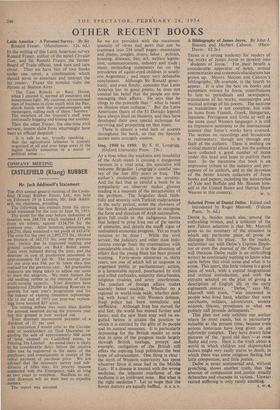DEFOE is, besides much else, among the enthralling writers, and
a criticism of the new Falcon selection is that Mr. Manvell gives us no summary of the situation in which apy particular piece of prose or dialogue finds its place. So the reader, unfamiliar say with Defoe's Captain Single- ton or even the Journal of the Plague Year will (because Defoe really is an enthralling writer) be continually wanting to know what came before this vivid scene and what is to come. This apart, this little volume is a good piece of work, with a capital biographical and critical introduction, and with the extracts selected on the plan of giving a description of English life in the early eighteenth century. "Defoe," says Mr. Manvell with truth, "was interested in people who lived hard, whether they were merchants, soldiers, adventurers, society widows, thieves, prostitutes or what we politely call juvenile delinquents."
This plan not only exhibits our author where he most excels, but is particularly valuable at the present time, because even serious historians have long given us an inferiority complex. They have drawn false pictures of the 'good old days'—at once flashy and rosy. Here is the truth about a world in which children and shipwrecked sailors might very easily starve to death, in which there was some religious feeling but little compassion, and little justice.
Defoe is never sentimental and, without preaching, shows another truth, that the absence of compassion and justice usually debauches and coarsens its victims. Unwar- ranted suffering is only rarely enabling.


































 Previous page
Previous page